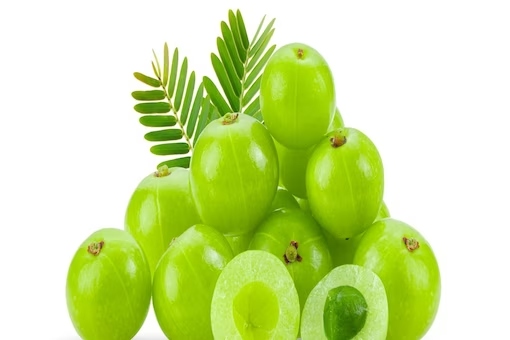Amla or Indian gooseberry, scientifically known as Phyllanthus emblica, has been an integral part of traditional medicines and Ayurvedic preparations in India due to its numerous health benefits. With around 600-700 milligrams of Vitamin C per 100 grams, amla is one of the best natural sources of this vitamin. Amla also contains various antioxidants, including polyphenols, flavonoids, and tannins, which can help protect cells from oxidative damage. Additionally, amla is rich in vitamin A, which is essential for improving and maintaining eye health. Vitamin A also enhances vision and reduces the risk of age-related macular degeneration.
How to consume amla for maximum health benefit?
Amla can be enjoyed in various forms, making it easy to include in your daily diet. The simplest way is to eat fresh Amla. You can wash the fruit, remove the seeds, and then either eat it or slice it to enjoy its tangy flavour.
If you prefer convenience, you can find Amla juice in stores or make your own at home by blending fresh amla with water, and you can add a spoon of honey for enhanced flavour.
Amla powder is another option, a concentrated form of fruit that can be sprinkled into your food, added to smoothies, or mixed into beverages.
When to consume amla?
The timing of amla consumption can influence its effectiveness in your daily routine. Many people choose to start their day with amla, either in the form of fresh fruit or juice. Amla in the morning can boost your energy levels and strengthen your immune system. You can also enjoy amla as a healthy snack between meals to satisfy your cravings and provide your body with essential nutrients. If you’re planning to engage in physical activities like a workout, consuming amla before exercising can give you an extra energy boost and enhance your stamina.
Benefits of consuming amla
Amla is celebrated for its numerous health benefits, making it a valuable addition to your diet. It is particularly rich in vitamin C, a powerful nutrient that supports your immune system and promotes healthy skin. Amla is also packed with antioxidants, which help combat harmful free radicals that can cause damage to your cells.
Additionally, amla is known for its digestive benefits. It can reduce acidity, support digestion, and aid in the absorption of essential nutrients. Many people also use amla to enhance the health of their hair and skin. It can help reduce dandruff and promote a radiant complexion.
Moreover, amla has been associated with heart health, as it aids lowering cholesterol levels.
Who should avoid amla?
While amla is generally safe and beneficial, there are certain situations where caution is needed or complete avoidance is recommended.
Pregnant or nursing women should consult a healthcare professional before adding amla to their diet to ensure it’s safe for their specific circumstances. If you have allergies to fruits or berries, it’s crucial to avoid amla to prevent allergic reactions.
Additionally, individuals with certain medical conditions or those taking specific medications should seek advice from their healthcare provider before significantly increasing their amla intake.
Always remember that it’s essential to consult a doctor before making any changes to your diet or adding any new ingredient.


